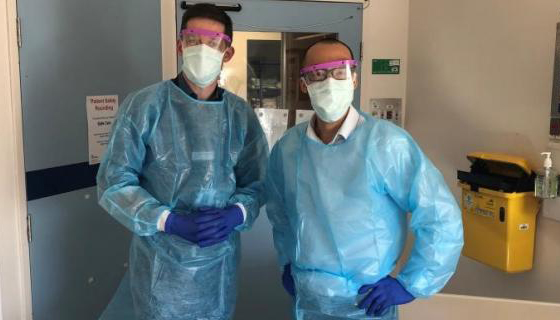Doherty Institute: Leading the response to COVID-19
Australia’s leading infectious disease institute is directing the response on the diagnosis, treatment and prevention of COVID-19, while developing critical insights that will inform the management of future pandemics.
 The Peter Doherty Institute for Infection and Immunity – a joint venture between the University of Melbourne and The Royal Melbourne Hospital – has identified several critical areas in need of community support. Three such projects are set to receive funds through the University’s COVID-19 Research Response Fund, which was established to support projects with potentially major impact, both now and in the future.
The Peter Doherty Institute for Infection and Immunity – a joint venture between the University of Melbourne and The Royal Melbourne Hospital – has identified several critical areas in need of community support. Three such projects are set to receive funds through the University’s COVID-19 Research Response Fund, which was established to support projects with potentially major impact, both now and in the future.
The global search to develop and rollout a universal COVID-19 vaccine led to the establishment of the COVID-19 Vaccine Development Initiative, which follows multiple possible avenues of vaccine development, including analysis of the immune response of those with moderate and severe reactions to the virus (SARS-CoV-2) that causes the COVID-19 disease.
This initiative occurs simultaneously with the Fast Track Antiviral Platform, which will rapidly identify, test and evaluate effective anti-COVID-19 drugs. This platform involves the testing of existing human-use drugs to see which have promise in preventing SARS-CoV-2 infection, replication and hosting. The process helps in the optimisation of new drugs that will offer greater specificity and potency against COVID-19, using advanced scientific methods. This highly collaborative work demonstrates the strength of research collaborations, with Doherty Institute scientists working alongside experts at the Bio21 Institute, Walter and Eliza Hall Institute, Monash University and CSIRO AAHL. Together, the collaborating partners aim to prevent clinical deterioration in people with moderate COVID-19 symptoms, improve outcomes for those suffering severe cases of the disease and reduce the period of COVID-19 infectiousness.
Meanwhile the Doherty Institute COVID-19 Agile Discovery Fund will give the Institute the resources required to aggressively pursue promising COVID-19 cures and treatments. When a vaccine or treatment shows significant promise, the Agile Discovery Fund will immediately supply the funds and resources to scale up and pursue results, giving that project the greatest chance of success. It cuts away bureaucracy, funding cycles and all the barriers traditionally known to prevent fast and responsive research ideas.
These projects build on the Doherty Institute’s existing breakthroughs, including being the first lab to grow the SARS-CoV-2 virus in a laboratory outside of China, and being the first to share it with public health laboratories globally. With generous support from donors such as The a2 Milk Company, the Jack Ma Foundation and the Paul Ramsay Foundation, this work is critical to making a vaccine possible.
Another major project from the Doherty Institute is the Australasian COVID-19 (ASCOT) Trial, which is the only national trial of an intervention for hospitalised COVID-19 patients. The ASCOT Trial aims to prevent those patients requiring admission to Intensive Care Units. This trial, implemented by some of the world’s leading infectious diseases experts, is initially testing two treatments, using drugs that are currently used to treat HIV and arthritis. The trial has been supported by Anthony Pratt and the Pratt Foundation, BHP Foundation and the Minderoo Foundation.
Collectively, donations to the Doherty Institute’s innovative COVID-19 related strategies have totalled more than $16 million.
For the latest information on research and activities conducted across the University in response to COVID-19, visit unimelb.edu.au/global-challenge
Image: Associate Professors Justin Denholm and Steven Tong as the ASCOT trial begins. Courtesy of the Doherty Institute for Infection and Immunity